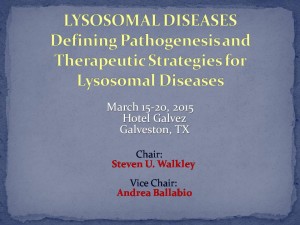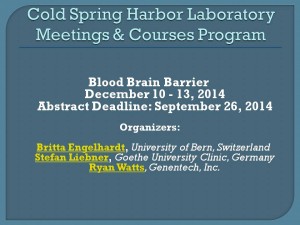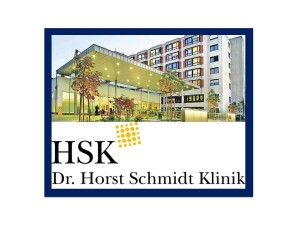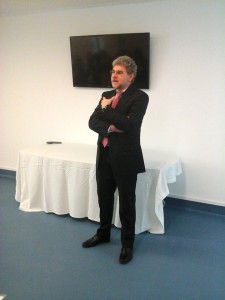 Inherited NeuRoMetabolic Diseases Information Network (InNerMeD-I-Network, 2012 12 12, Second Health Programme 2008-2013).
Inherited NeuRoMetabolic Diseases Information Network (InNerMeD-I-Network, 2012 12 12, Second Health Programme 2008-2013).
Inherited NeuRoMetabolic Diseases Information Network (InNerMeD-I-Network ) is an European project funded within the Second Health Programme of the European Commission by the Directorate-General for Health & Consumers (DG SANCO). It started on the 1st of April 2013 and was officially kicked off in Luxemburg on May 21st 2013. InNerMed project is aimed to create a multimedial network of information targeted on research, diagnosis and treatment of inherited neurometabolic diseases.
Inherited NeuroMetabolic Disorders (iNMDs) represent an important group of Rare Diseases constituted by genetic metabolic disorders showing clinical neurologic/cognitive symptoms at any time during the progression. They are mostly associated with high morbidity and mortality rates hence representing a significant burden on patients, their families, the health care system, and the society. Most patients, in fact, begin showing signs of the disease early in childhood, often in the first year or two of life. CNS pathology in particular causes mental retardation and progressive neurodegeneration that ultimately ends in early death of these young patients. Today, available therapies capable of arresting the disease natural course exist but many of them are efficacious only if administered before neurodegeneration becomes irreversible. Timely diagnosis and early treatment are therefore crucial.
Increasing awareness is therefore the first key step in fighting these conditions. Unfortunately, because of iNMDs low-prevalence, there is often lack of information about these conditions and it remains difficult to find clinicians knowledgeable about the diagnosis, management and treatment of these conditions. Getting a correct diagnosis is one of the major challenges for affected children: it can take several years from the time of first symptoms to the one of disease recognition and initial treatment. During this long and frustrating period, families frequently seek advice from numerous doctors and consult different specialists often receiving diverse incorrect diagnoses.
To this aim, InNerMeD-I-network wants to create a network of information targeted on diagnosis and treatment of iNMDs based on the collection and exchange of proper information among scientific community, health professionals, patients, patients association and all other interested stakeholders active in the field of iNMDs.
THE PARTNERS
InNerMeD-I involve a formidable concentration of competences combining partners specific expertises.
The partnership includes both public and private referral clinical centres:
- the Brains for Brain Foundation, coordinator and main leader partner, thanks to its great expertise gathered in the neurological field and its long-standing experience in the exploitation and dissemination of new scientific knowledge and contribution to the implementation of EU research activities particularly assures the partners coherence and capacity to share decisions and to put together relevant knowledge and research capacity;
- the Benzi Foundation, strategic partner for the management and for the set up of the ICT platform. The Benzi Foundation has extensive experience in the realisation and management of IT tools. It supported TEDDY NoE (FP6 project) and currently supports GRIP (Global Research in Paediatrics, FP7 project started on January 2011) in the realization of e-learning courses.
- the Center for Metabolic Disorders at the University of Copenaghen (RH) covers the whole of Denmark concerning diagnosis, biochemical monitoring, clinical evaluation and treatment of patients with metabolic disorders, and in particular with Lysosomal Storage Disorders;
- the Center for lysosomal storage disorders at the University of Mainz (UMC-M) takes care of about 800 patients with lysosomal storage disorders, and participates in clinical trials for enzyme replacement therapy as well as in several EU projects;
- the University of Zagreb School of Medicine (UZSM) is the oldest educational institution for medical training and research in the South-East Europe and works actively in biomedical research;
- the Hospital Sant Joan de Déu (HSJD) is the Spanish referral center for Neurometabolic diseases and paediatric care.
The Network will contribute to reduce the knowledge gap affecting iNMDs in different ways:
- providing a critical mass of competences, instead of a dispersed expertise;
- providing validated customized information at all levels about iNMDs;
- stimulating innovative research projects to enforce European leadership on iNMDs;
- fostering the identification of group of patients to be included in biomedical research (registries and clinical trials);
- translating scientific breakthroughs into clinical practice;
- generating social benefit to the aim of establishing a standard of care for patients with iNMDs across Europe.
InNermed objectives of increasing current knowledge on iNMDs will be mainly achieved by the collection, harmonization, simplification, validation, organization and dissemination of all the available scientific data and information on iNMDs, including those regarding
- centres of expertise,
- websites of reference,
- recommendations,
- guidelines,
- and all data on diagnosis and treatment of iNMDs.
The strength of InNerMed project relies on its capacity of creating a reference tool for further interesting activities to be developed after the project will be ended such as:
- a unique European network that will facilitate research in the iNMD area;
- the generation of new data on epidemiological and genetic aspects;
- the provision of informative and consultative support to pharmaceutical companies and Health Institutions;
- setting-up a Paediatric Network for developing trial and research.
Such Initiative represents an important step forward the establishment of a fruitful collaborative EU networking and cooperation to raise awareness about iNMDs and keep them on the health-care agenda. Although iNMDs are by definition individually rare, collectively they affect millions of people worldwide. A joint effort to tackling rare diseases, including pooling and coordinating of information and scientific resources, is essential to ensure that affected patients are given the priority they deserve and that their needs are met.
ROLE OF THE B4B FOUNDATION
B4B is the organization leading the InNerMeD project and thanks to its meaningful expertise in the management of projects and its long-standing experience and solid clinical competence in the field of child neurological disorders assures the partners coherence and ability to share decisions and put together relevant knowledge and research competences.
In particular, because of its solid experience in developing and fostering networking and collaboration of synergy among research centres and experts and its capacity in
strengthening the tie between basic and clinical research in the neurological field, B4B is leader of WP1 and WP2 with the following roles and responsibilities:
WP1 – Coordination of the project
B4B provides the scientific leadership of the overall project assuring the good scientific, administrative, technical coordination and management of the project, closely monitoring integration activities and joint research in order to ensure that the network is operating effectively and to confirm that milestones and deliverables are being achieved (or recommend corrective action if necessary).
WP2 – Dissemination of the project
B4B is responsible for the exploitation and dissemination of new scientific knowledge according to the detailed dissemination plan developed at the beginning of the project which is finalised to maximize the impact of the project and to increase its awareness among the different stakeholders. In particular, B4B is in charge of spreading awareness about objectives and potentiality of the project and disseminating deriving achievements and results within a large scientific and lay community including patient and Health Authorities. Several dissemination strategies will be undertaken to ensure the appropriate propagation of the main topics and in particular: the keywords to be mentioned in the activities; the iNMDs specific characteristics (genetic, disabling, sharing among them diagnostic tools and biomarkers, therapeutic orphan, etc); the low awareness on the current situation of the major stakeholders including health authorities; the need to identify new markers and to develop multinational/multidisciplinary research; the need to inform and empower patients and their families; the development of collaborations among all involved stakeholders, including Financing Bodies.
To Download the electronic PDF of informative leaflet about the InNerMed-I-Network project please click here.
For more information:
 Transporter – Meeting taking place in Bad Herrenalb close to Karlsruhe, Germany, from May 11th to May 13th 2015.
Transporter – Meeting taking place in Bad Herrenalb close to Karlsruhe, Germany, from May 11th to May 13th 2015.








 Inherited NeuRoMetabolic Diseases Information Network (InNerMeD-I-Network, 2012 12 12, Second Health Programme 2008-2013).
Inherited NeuRoMetabolic Diseases Information Network (InNerMeD-I-Network, 2012 12 12, Second Health Programme 2008-2013).